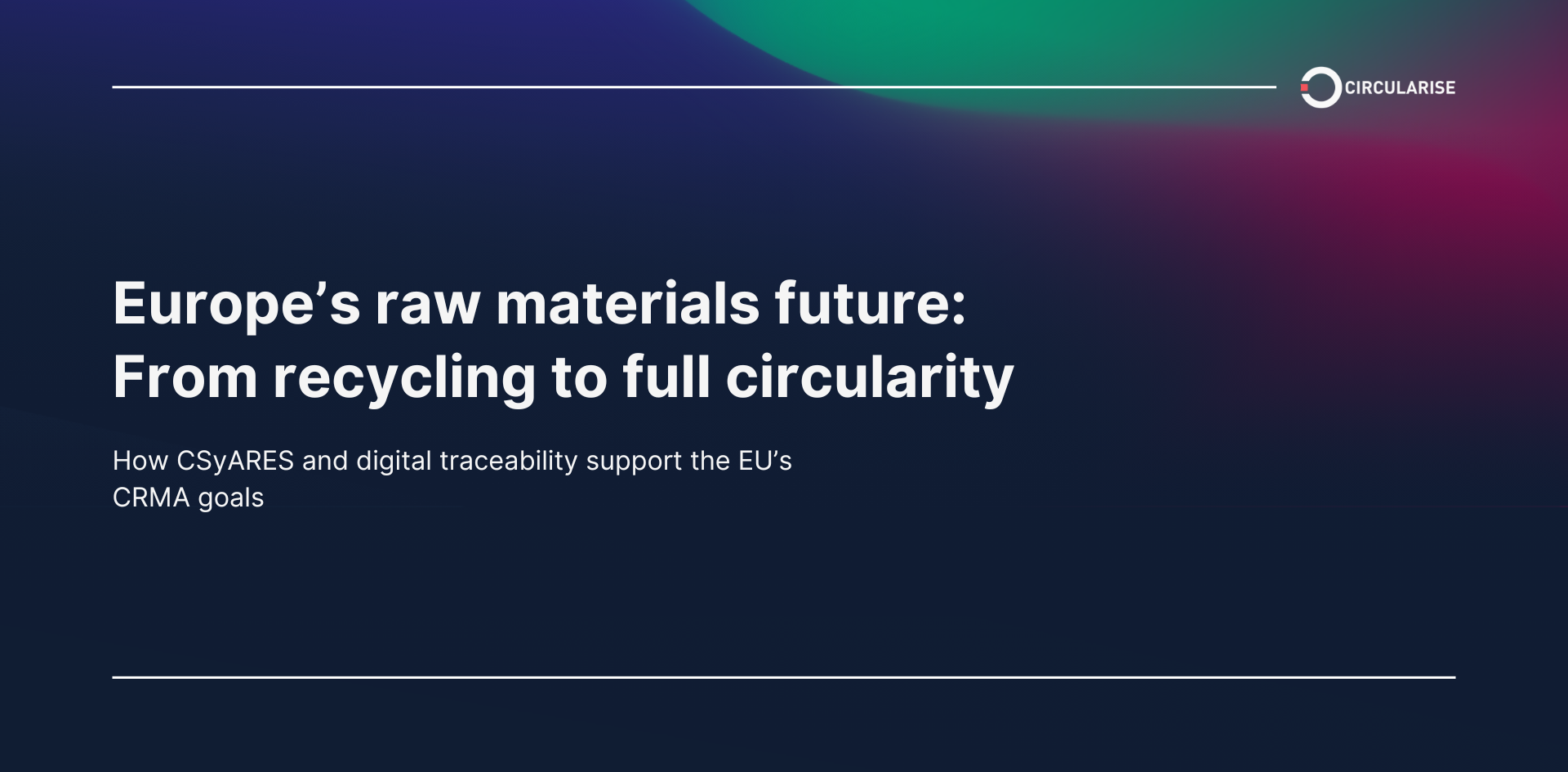This article is Part 3 of a 3-part series on greenwashing. Read Part 1 and Part 2.
The world is paying attention and regulations are getting updated. New technologies such as ClimateBert and Circularise’s Digital Product Passports (DPPs) are being deployed to identify and combat greenwashing. Increasingly, organizations are expected to be held accountable for their negative impacts on the environment and to prove the veracity of their sustainability claims – especially if they are profiting from making those claims.
Here is an overview of the regulations that could affect your business, and a closer look at the new ones coming into play.
EU Regulations
- Corporate Sustainability Reporting Directive (CSRD)
- Green Claim Directive (GCD)
- Unfair Commercial Practices Directive (UCPD)
- Initiative on Substantiating Green Claims
- Right to Repair Initiative
- Sustainable Products Initiative
- Circular Economy Action Plan (CEAP)
- Extended Producer Responsibility (EPR)
- Dutch ACM Guidelines on Sustainability Claims
- German Supply Chain Act (LkSG)
UK Regulations
- CMA’s Green Claims Code
- ASA’s CAP and BCAP Codes
- Proposed new digital markets, competition, and consumer bill
- FCA updates to Sustainability Disclosure Requirements (SDR) and investment labels
US Regulations
- Proposed update to Federal Trade Commission (FTC) Green Guides
- US Securities and Exchange Commission (SEC) proposed amendments
- Proposal for the Federal Supplier Climate Risks and Resilience Rule
In Part 1, we examine the definitions of what a sustainability claim is and the current state of greenwashing. Part 2 covers some high-profile greenwashing cases in various sectors and details the negative consequences and legal risks these companies faced, while Part 3 explores the new regulations being drafted and enforced around sustainability claims, and talks about how companies can prevent greenwashing.

Understand the EU’s Green Claims Directive (GCD)
The new Green Claims Directive proposal1 seeks to empower, support and enable consumers for the green transition. It will apply to businesses operating in the EU that have more than 10 employees, and generate revenues that exceed 2 million, and will also include companies based outside the EU that target EU consumers.
These new regulations provide a framework to assess the environmental impacts of products against the sustainable claims made by companies. It is designed to ensure that consumers have accurate information on the sustainability, durability, and reparability of products in order to make informed buying choices, and to counter unethical and unsustainable practices such as greenwashing and early obsolescence.
Under this new proposal, traders are obliged to provide consumers with sufficient information on the durability and reparability of a product. Amendments to the Unfair Commercial Practices Directive (UCPD) and Consumer Rights Directive have been proposed, with the new practices that include the following:
- Companies promoting their products as "climate neutral" or "made from 100% recycled materials" or “all-natural ingredients” must be able to back up their claims with evidence
- Companies cannot make generic or vague environmental claims that cannot be proven such as “environmentally friendly”, “eco” or “green” to give the impression of greener environmental performance
- Companies cannot make a sustainable claim about the entire product when it concerns only an aspect of the product
- Companies must back up claims based on promises of future environmental performance by milestones and specific dates
- Companies that buy carbon credits to offset their own environmental impact must disclose this when making environmental claims
- Sustainable claims of a positive environmental impact must also disclose if it causes a negative impact in another area
- Companies cannot display a voluntary sustainability label not established by public authorities or audited by a third-party verification scheme
- Consumers must be informed that a product has limited functionality when using products that do not have spare parts or accessories provided by the original producer
- Consumers must be informed about features introduced to limit durability, such as software which stops or downgrades the functionality of the product after a particular period of time
Sustainable claims made by companies will need to be audited and verified by third-party providers. The Life-Cycle Assessment (LCA) is one such methodology that can scientifically and quantitatively measure the impact of a product, its production process, and its impact on the environment from raw materials to end-of-life. The European Commission has even developed two standards based on the LCA approach for companies to prove their claims: the Product Environmental Footprint (PEF), and Organisation Environmental Footprint (OEF), which form the basis EU Environmental footprint2. As efforts ramp up to harmonise LCAs, the industry average data can also be used to detect greenwashing claims.
Once in force, EU Member States will have an 18-month period to incorporate it into their national laws. According to Deloitte3, they “estimate that in principle the requirements will apply from 2026, although this timeline may change depending on the speed of EU negotiations on the final text.” The EC will also provide funding support for companies to provide the data necessary to substantiate claims and develop calculation tools for small and medium-sized enterprises4.
This draft complements the Green Claims Initiative and the Sustainable Products Initiative, covering all products and services sold within the EU. This means that EU countries would be establishing a system to verify companies' sustainability claims and impose penalties for non-compliance with support from the EU Commission to better deal with greenwashing violations in a coordinated way. If you are in breach of these new regulations, consumers would be able to seek compensation from your company.
The UK updates Digital Markets, Competition and Consumer Bill and advertising standards
In the Autumn Statement 20224, the UK Government confirmed its plans to implement reforms that will have a significant impact on the regulatory landscape in the UK. The proposal will give the Competition and Markets Authority (CMA) more power to enforce consumer law and penalise offending companies without the need to go to court. For breaches of consumer law, CMA will have the ability to impose fines of up to 10% of global annual turnover on businesses, and fine individuals up to £300,000.
New regulations from the Advertising Standards Authority (ASA)5 set significantly stricter standards for net zero and sustainability claims companies make in advertisements. Even when sustainable claims can be proven or are technically correct, companies must ensure that their advertisements do not mislead consumers about their environmental benefits.
Generic claims cannot be made without verification. Evidence must be provided to show that the sustainable claim applies to the entire lifecycle of the product or service, from manufacture to disposal. If general claims cannot be justified, the limits of the lifecycle must be made clear. For example, an electric vehicle making a zero emissions claim may be acceptable if the ad clarifies that the claim is related only to driving.
Absolute claims like “environmentally friendly” must only be made if it can be shown that the product or service has no detrimental effect on the environment during its entire lifecycle. If claims are not universally accepted, they cannot be advertised as such and must be made clear to consumers.
Here are examples of generic claims which are likely to be considered full product lifecycle claims that are no longer allowed to be used if not scientifically backed by data:
- Give back to the environment
- Less plastic
- Good for the planet
- Good for the land
- Helping to support a more sustainable future
- 100% eco-friendly
- Environmentally friendly
- Zero emissions
- Carbon neutral
- Net zero
The most common claims made were “carbon neutral” and “net zero” but with little consensus on their meaning. Consumers believed that such claims meant that these companies had achieved an absolute reduction in carbon emissions without just relying on carbon offsetting practices. There are calls for significant reform to simplify and standardise the definitions of such terms, and for such claims to be endorsed by an official body. Any claims based on future sustainability goals relating to reaching net zero or achieving carbon neutrality must also present a verifiable strategy to achieve them.
Proposed regulation amendments in the US
The U.S. Federal Trade Commission (FTC) and the U.S. Environmental Protection Agency established the Green Guides to provide guidance for companies making sustainable claims. First developed in 1992, they are currently under review for a new revision that will improve ESG transparency among companies, and will likely add guidance on topics such as6:
- Carbon offsets
- Climate change
- Using terms such as “recyclable”, “organic”, and “sustainable”
- Guidance on energy usage or energy efficiency home-related products, electric vehicles (“EVs”), or other products
- Enforceability of the FTC Act
Although the Green Guides themselves are not legally binding, they are often used in litigation at administrative, state, and federal court levels. Companies and marketers need to pay attention to the potential alterations to the Green Guides, which will play a key role in sustainable marketing claims in the future.
Additionally, the US Securities and Exchange Commission’s (SEC) new proposal7 will include new reporting and disclosure requirements, and be extended to include any investment fund that has a name that implies that ESG factors are considered in their investment decisions. Public companies would be obliged to disclose information about their direct and indirect GHG emissions from their supply chains and customers.
They have also proposed to amend the Names Rule of the Investment Company Act8 to state that it is “unlawful for any registered investment company to adopt as a part of the name or title of such company, or of any securities of which it is the issuer, any word or words that the Commission finds are materially deceptive or misleading.”
The Federal Supplier Climate Risks and Resilience Rule9, announced by the Biden administration in November 2022, is yet another proposed regulation being developed. Under this regulation, large federal government contractors will be required to "disclose their greenhouse gas emissions and climate-related financial risks and set science-based emissions reduction targets."
How to prevent greenwashing in your organisation
Prevent greenwashing by taking the necessary steps to ensure that your sustainability claims are accurate and supported by scientific evidence using methodologies such as LCAs and DPPs. Although companies are likely to face challenges implementing these changes, here are some top tips from our experts to help you with the transition:
- Transparent chain of custody: Have an appropriate chain of custody model in place and be transparent about how you collect reliable, auditable data. This is necessary for trustworthy sustainability claims to be made. A lack of transparency could prevent employees from obtaining relevant information and making informed choices to meet sustainability goals, or even allow dishonest and fraudulent behaviour.
- Sustainable claims management framework: Companies must gather data from raw materials to end-of-life, and verify their claims via an independent, accredited third-party verifier or auditor. A key part of this would be gathering data for conducting LCAs or implementing a DPP in order to be able to evidence sustainable claims.
- Cooperation between stakeholders: All the necessary data does not just come from within the company. It must also include information from the stakeholders all along the entire value chain, which is why transparency and cooperation are required for all stakeholders to work together.
- Technological innovation: New technologies, such as blockchain and zero-knowledge proofs, can help with trust and the secure distribution of relevant data, without the unnecessary disclosure of confidential information.
- Monitor regulations and claims: Companies will need to monitor the rapidly evolving regulatory changes, adapt internal compliance policies, and review sustainability messaging to minimise legal and regulatory risks. Ensure that public commitments to sustainability are backed up by actionable, measurable plans.
- Educate employees: Conducting training to educate and update marketing and communications staff on sustainability, definitions, and regulations can help companies avoid accidental greenwashing. Have a dedicated team or person to oversee the sustainable claims management process.
Conclusion
Greenwashing may be a quick and effective way for businesses to attract consumers and investors who care about the environment, but this deception could be a costly mistake. We are likely to see even more high-profile greenwashing cases as regulations catch up with the growing public concern over climate change. There must be a genuine commitment to sustainability goals, and the actions of your company has to be accurately aligned to avert greenwashing within your organisation.
Go back to Part 1 for more on what a sustainability claim is and the current state of greenwashing. In Part 2 we look at some notable examples of greenwashing and examine the negative consequences of greenwashing companies faced. You can also read our article on how to avoid greenwashing in the US, UK and the Netherlands.

Circularise is the leading software platform that provides end-to-end traceability for complex industrial supply chains. We offer two traceability solutions: MassBalancer to automate mass balance bookkeeping and Digital Product Passports for end-to-end batch traceability.


.png)



